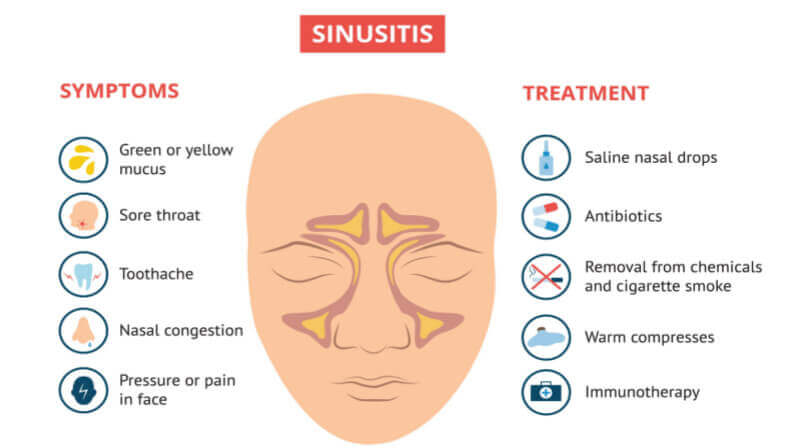Have you been dealing with a stuffy nose for quite some time already? Maybe it’s no longer the usual cold or allergy.
Sinusitis can be the culprit, especially if the prolonged infection seems not to go away even with medications.
Now, what is a sinus infection? Read on to know if this might be the reason for your clogged nose.
What is sinusitis?

Sinusitis is an inflammation of the tissue lining the sinuses.
Sinuses refer to the four cavities or spaces in the head that are filled with air. They connect through narrow channels.
They work on making thin mucus that drains out of the channels of the nose and keeps it clean and bacteria-free.
Types of sinus infection
Sinus infections are not the same. It varies depending on the type of infection and the symptoms.
There are two types of a sinus infection:
Acute bacterial sinusitis
This sinusitis occurs suddenly and does not go away even after ten days. The symptoms include runny nose, stuffy nose, and facial pain. This sinusitis also recurs and comes back with worse symptoms than the first infection.
Chronic sinusitis
This type of infection comes with symptoms of nasal congestion, decreased sense of smell, facial pain, and drainage. It lasts for at least 12 weeks.
How do you get a sinus infection?
Sinus infections happen when the sinuses get blocked with fluid, letting bacteria grow. When the sinus tissue gets inflamed, the nasal tissue gets affected and becomes swollen.
What causes sinus infections

Sinus infection is a common illness and can happen to anyone.
Over 31 million people have sinusitis in the United States. However, you have a higher risk of developing sinusitis if you have conditions such as nasal polyps, asthma, allergies, and abnormal nose structure.
Sinusitis develops when fluid clogs the sinuses, causing viruses and bacteria to form and swell.
These are what causes sinus infections:
- Common cold
- Nasal and seasonal allergies
- Polyps
- A deviated septum. An abnormal form of cartilage in the nose that causes blockage
- Weak immune system
- Smoking
Symptoms of sinus infection
You cannot easily distinguish if you have sinusitis when you catch a cold. Sinus infection symptoms are usually the same as a common cold and allergies.
Sometimes, sinusitis and allergy symptoms occur simultaneously with a common cold, making diagnosis harder.
What are the symptoms of sinus infection and how will you know that it is indeed sinusitis?
These are the common signs of sinusitis:
- Post nasal drip. The mucus flows down the throat
- Nasal discharge. Commonly a thick yellow or green discharge from the nose
- Facial pressure. Pain in the nose, forehead, cheeks, ears, and teeth
- Bad breath. Oral health problem or commonly known as halitosis
- Fever. Increase in body temperature that goes on for weeks
- Weakness. Restlessness and tiredness for days
- Cough. Continuous coughing for weeks
How do doctors diagnose a sinus infection

If you have sinusitis symptoms, the best action to take is to go to your doctor for a check-up.
Upon consultation, your doctor will probe your symptoms and conduct a series of tests, including a physical examination. The specialist will thoroughly examine your ears, nose, and throat and check if there is any draining or blockages.
Moreover, your health provider may use an endoscope, an optical instrument, to look inside your nose if needed. A computed tomography (CT) scan can also be conducted depending on the diagnosis. For further assessment, your doctor can refer you to an ear, nose, and throat (ENT) specialist.
It is essential to seek medical attention when developing warning signs to prevent the sinus infection from worsening, which may affect your daily routine.
When to go to ER for sinus infection
Sinus infection can last for a long time, typically up to 12 weeks. While some can endure sinusitis, there are signs that you need to go to the ER as soon as possible.
Here are the symptoms that would tell you when is a sinus infection an emergency:
High Fever
On-and-off fever lasts for over a week and comes with rash, vomiting, and diarrhea.
Severe Pain
A common symptom for which you need immediate medical treatment is a severe headache and facial pain. You may also experience unbearable abdominal pain.
Chronic Sinus Infections
If you keep having the same symptoms for over two weeks without getting better, a trip to the ER is the best way to stop the signs, especially if there is already difficulty breathing.
It may also be possible that there is an underlying condition you may not have discovered yet. It is always best to go to the ER to find out what’s causing you recurring fever and pain.
Consult a doctor for immediate medical treatment is vital to prevent the infection from weakening your body.
Go to Aether Health – Kingwood ER in Kingwood, Texas, if you experience these symptoms, most especially difficulty in breathing and severe pain.
Treatment for sinus infection

How is sinusitis treated? There are several ways to treat sinus infections, depending on the severity of the case.
For mild sinusitis, you can get rid of the symptoms with:
- Decongestants
- Over-the-counter cold and allergy medications.
- Nasal saline irrigation
- Drinking fluids
For sinusitis that has been lasting for ten days, you need:
- Antibiotics
- Prescription intranasal steroid sprays
- Oral or topical decongestants
Your doctor will determine how long you need to take antibiotics and sprays.
Lastly, chronic sinusitis involves the treatment of other underlying conditions such as allergies.
The treatment includes:
- Intranasal steroid sprays
- Antihistamines
- Medications to reduce swelling and allergy symptoms
- Saline solutions
However, your doctor will have to order a CT scan to check on your sinuses when the sinus infection does not go away even after the treatments mentioned.
It is possible to have surgery if the doctor finds structural problems in your sinuses. People with polyps and fungal infections are most likely to undergo surgery.
Call Aether Health – Kingwood ER and book a free medical consultation if you develop sinus infection symptoms.
Home remedies for sinus infection

Medications are the best way to get rid of sinus infections. But if you want to try simple ways to treat it at home, there are several tips on how you can do it.
- Humidify. A humidifier helps to break mucus and relieve a stuffy nose. Put a humidifier in areas in your home where you consistently spend a lot of time. Make sure you clean your humidifier regularly so it will not accumulate dirt that may trigger allergies.
- Steam vapors. Inhaling steam vapors can help in decongesting your nose and easing inflamed passages. You can do this while running the shower or putting warm water in a bowl.
- Use warm heat. When facial pain develops, put a warm, wet towel on your face to ease the pressure.
- Try a nasal saline solution. Saline keeps nasal passages moist, which helps to decongest the clogged nose.
- Nasal irrigation. Keep your sinuses moist by flushing out mucus and other debris. Bulb syringes help in nasal irrigation.
- Drink lots of water. Water can thin the mucus, which makes it easier to flush out. Avoid drinking alcohol as it causes the inflammation of the nasal passages even worse.
- Rest. A sinus infection can get in the way of doing your everyday tasks. Take a rest and get plenty of sleep to help your body recuperate.
Home remedies are a great option to reduce symptoms. However, if your mild sinusitis develops into a severe case, you need to talk to a doctor for the next steps.
How to prevent sinus infections
You can prevent sinus infections by making simple lifestyle changes and being mindful of protecting your health.
- Observe hand hygiene. Always ensure your hands are clean to avoid acquiring bacteria and germs.
- Get vaccinated. Have yourself immunized with the flu and pneumococcal vaccines to limit the chances of catching colds quickly.
- Avoid sick people. close contact with people who have respiratory infections. Having a sick person around you increases the chance of infection transmission.
- Quit smoking. Shift to a healthier lifestyle and cease smoking cigarettes.
- Use a humidifier. A humidifier is a recommended product for people with sinusitis. It keeps the air moist at home, which relieves your sinus.
- Avoid allergy triggers. Avoid irritants like dust, smoke, and pollen if you have allergies.
- Keep household clean. Dirt triggers allergies which can exacerbate sinusitis. Maintain a clean and tidy house for better air circulation and prevent irritation in the nose.
ER for severe sinusitis symptoms

While sinusitis can be managed at home, you might wonder when to see a doctor for a sinus infection.
You must go to an ER doctor for immediate medical treatment if you experience severe symptoms like difficulty breathing and unbearable pain.
Doctors will have to quickly examine to assess what proper antibiotics to give you to alleviate the pain and help you recover fast.
If you are in Kingwood, Texas, go to Aether Health – Kingwood ER to get the best medical treatment in an instant.




